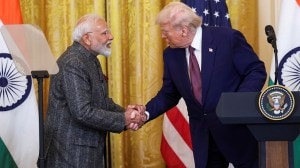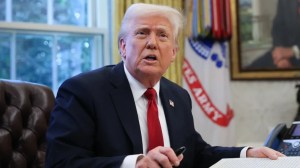Supreme Court to ‘immediately look into’ Arvind Kejriwal’s plea against ED arrest
On April 9, the Delhi High Court rejected Kejriwal's plea challenging his arrest by the Enforcement Directorate in the excise policy case.
 Delhi Chief Minister and AAP Convenor Arvind Kejriwal leaves from the Rouse Avenue Court in the excise policy-linked money laundering case, in New Delhi. (PTI)
Delhi Chief Minister and AAP Convenor Arvind Kejriwal leaves from the Rouse Avenue Court in the excise policy-linked money laundering case, in New Delhi. (PTI)Chief Justice of India D Y Chandrachud said on Wednesday he will look “immediately” into the request to take up Delhi Chief Minister Arvind Kejriwal’s plea challenging his arrest by the Enforcement Directorate (ED) in connection with the excise policy case.
On April 9, the Delhi High Court rejected Kejriwal’s petition challenging the arrest.
Appearing for Kejriwal, Senior Advocate A M Singhvi informed the bench presided by CJI Chandrachud that the High Court ruling was based on an “unrelied document which was suppressed” from him. CJI Chandrachud asked him to send an email as is the Standard Operating Procedure (SOP) and that he will look into it “immediately”.
While dismissing the plea, the Delhi High Court said the ED was in “possession of enough material” which led to Kejriwal’s arrest.
The single-judge bench of Justice Swarana Kanta Sharma said, “The present petition challenges the arrest of the petitioner and states that the arrest was in violation of Section 19 PMLA (Prevention of Money Laundering Act). Before proceeding further this court would like to clarify at this stage the present petition is not an application seeking a grant of bail but release on the ground that the arrest of the petitioner is illegal and in violation of principles laid down by SC in Pankaj Bansal v UOI”.
The High Court added, “The material which has been collected by the ED reveals that Arvind Kejriwal conspired with other persons and was actively involved in the formulation of the Delhi excise policy 2021-2022… He is also allegedly involved in the offence of money laundering…in his personal capacity… Secondly in his capacity as the national convenor of the AAP…for use of the proceeds of crime for the election campaign for Goa elections.”
The ED arrested Arvind Kejriwal on March 21 after the Delhi High Court denied him protection from coercive action by the central anti-money laundering agency. The Rouse Avenue Court on April 1 sent him to judicial custody till April 15.







